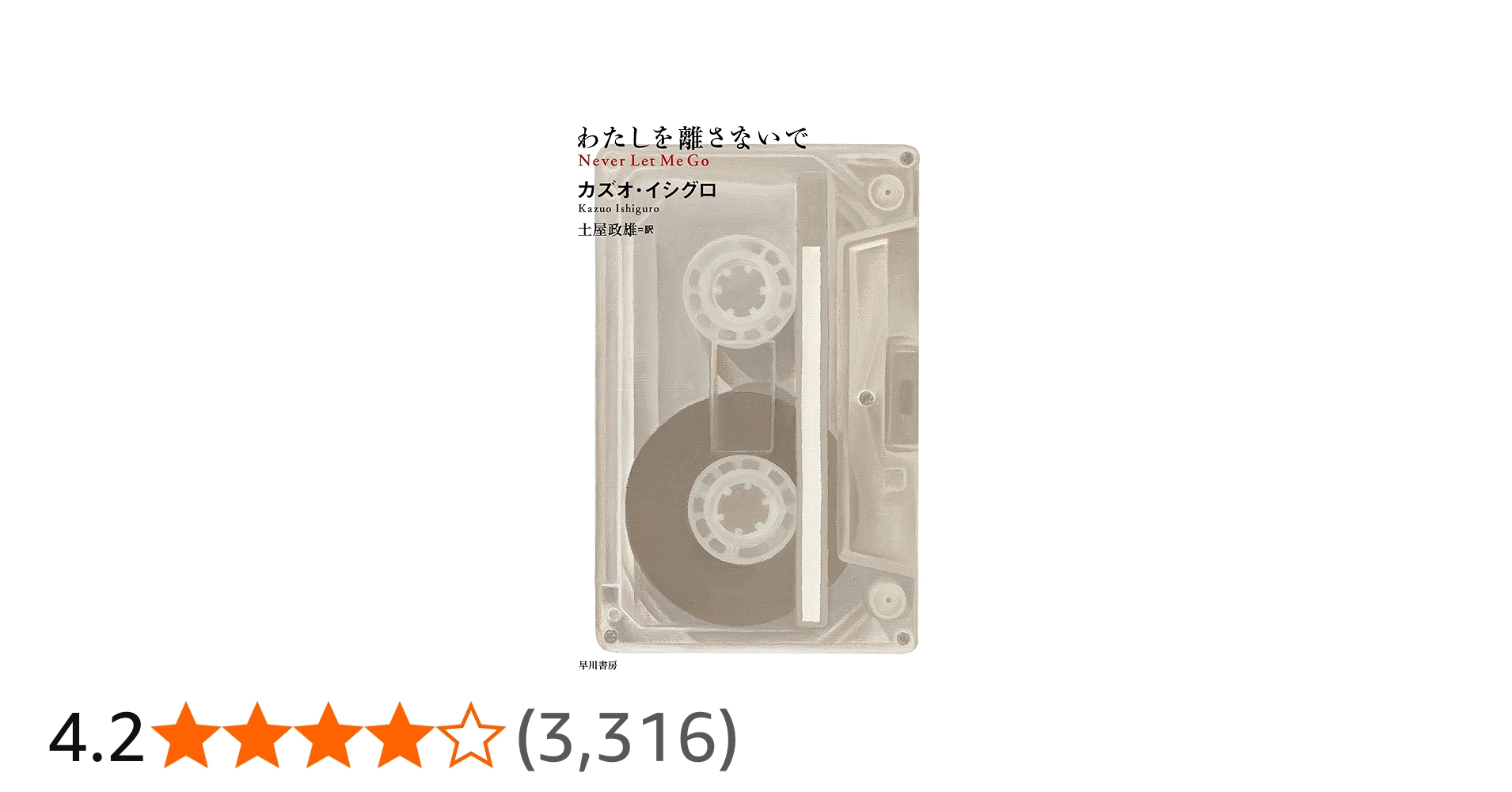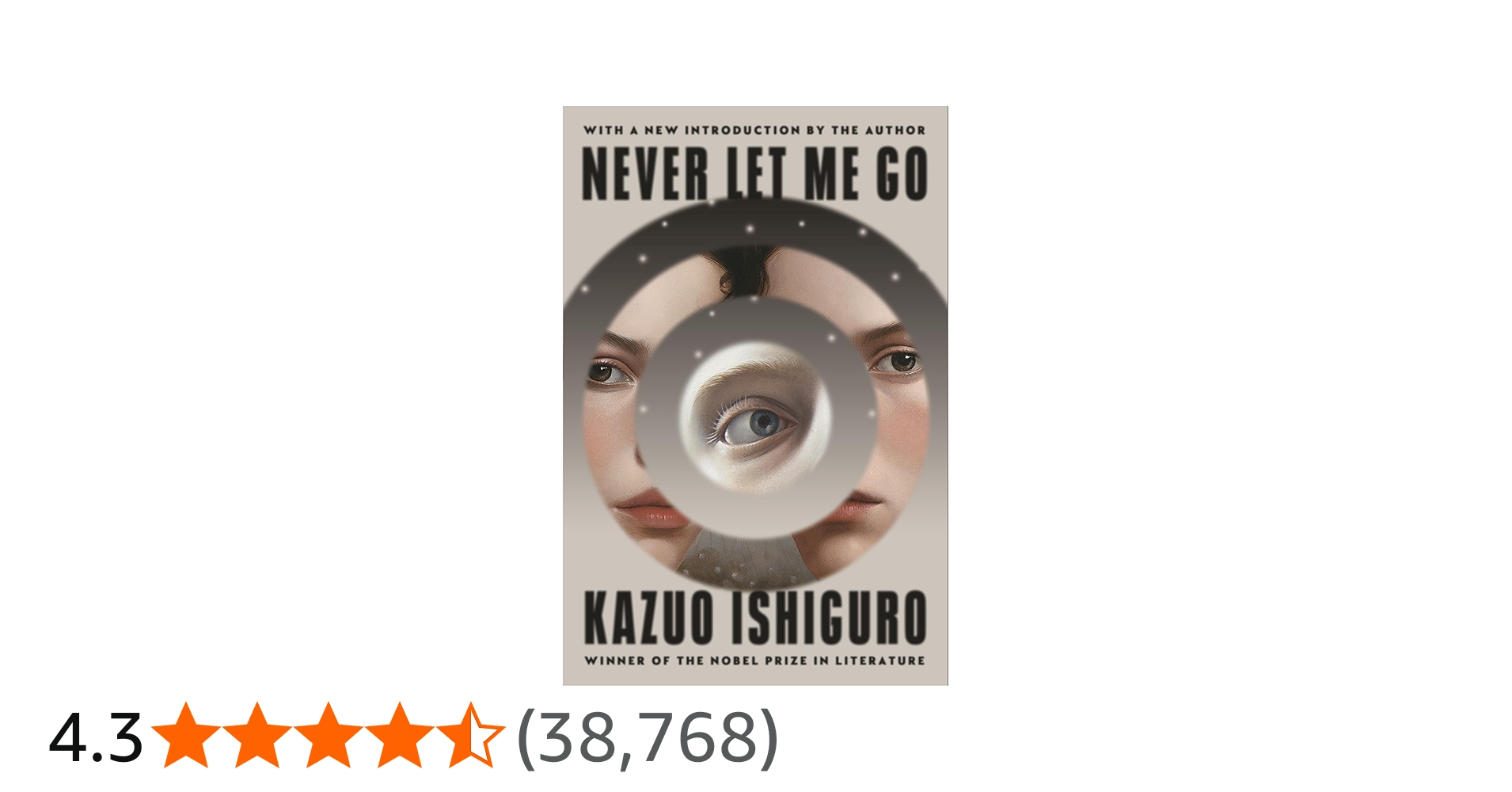Questions and Topics for Discussion / Never let me go
ディスカッションのための質問と話題 / 「わたしを離さないで」 カズオ・イシグロ
用語理解にかかった時間
Kathy introduces herself as an experienced carer. She prides herself on knowing how to keep her donors calm, “even before fourth donation” [p. 3]. How long does it take for the meaning of such terms as “donation,” “carer,” and “completed” to be fully revealed?
1.キャシーは経験豊富な介護人として自己紹介します。彼女は、たとえ4回目の提供の前でも、提供者を穏やかに保つ方法を知っていることに自信を持っています。あなたが「提供」、「介護人」、「使命を終える」などの用語の意味を完全に理解するまで、どのくらい時間がかかりましたか?
キャシーは誰に語っている?
Kathy addresses us directly, with statements like “I don’t know how it was where you were, but at Hailsham we used to have some form of medical every week” [p. 13], and she thinks that we too might envy her having been at Hailsham [p. 4]. What does Kathy assume about anyone she might be addressing, and why?
2.キャシーは直接的に読者に呼びかけます。「あなたがどこにいたのか分からないが、ヘ-ルシャムでは毎週何らかの形の医療チェックをしていた」キャシーは、読者がヘ-ルシャム出身者を羨むように、自身を幸運だと感じています。キャシーは、誰に語りかけているのでしょうか?その理由は何ですか?
ヘールシャムの意味
Why is it important for Kathy to seek out donors who are “from the past,” “people from Hailsham” [p. 5]? She learns from a donor who’d grown up at an awful place in Dorset that she and her friends at Hailsham had been really “lucky” [p. 6]. How does the irony of this
designation grow as the novel goes on? What does Hailsham represent for Kathy, and why does she say at the end that Hailsham is “something no one can take away” [p. 287]?
3.なぜ、キャシーにとって、「過去に繋がりがある人々」や「ヘ-ルシャム出身の人々」を見つけだすことが重要なのでしょうか。彼女はドーセットのひどい環境で育った提供者から、ヘ-ルシャム出身であることは本当に “ラッキー”だったことを学びました。小説が進むにつれ、この言葉に含まれる皮肉的な意味合いがどのように増幅されていきましたか?キャシーにとってヘ-ルシャムとは何を意味しますか?最後に、キャシーがヘ-ルシャムを”誰にも奪うことができないもの”であると言ったのはなぜでしょう?
ヘールシャムにおける創造性
Kathy tells the reader, “How you were regarded at Hailsham, how much you were liked and respected, had to do with how good you were at ‘creating’” [p. 16]. What were Hailsham’s administrators trying to achieve in attaching a high value to creativity?
4.キャシーは読者にこう言います。「あなたがヘ-ルシャムでどのように評価されたか、あなたがどれほど好きで尊敬されたかは、あなたが「創造」していたことと、どのくらい関係があったのでしょうか?」ヘ-ルシャムの管理者は、創造性に高い価値を付けるために何を達成しようとしていましたか?
キャシーの独り語り
Kathy’s narration is the key to the novel’s disquieting effect. First person narration establishes a kind of intimacy between narrator and reader. What is it like having direct access to Kathy’s mind and feelings? How would the novel be different if narrated from Tommy’s point of view, or Ruth’s, or Miss Emily’s?
5.キャシーの独り語りは、この小説に不安定な効果をもたらす鍵です。一人称での語りは、語り手と読者との間に一種の親密さを確立します。読者がキャシーの思考や気持ちに直接アクセスできるのはどういう意味があるのでしょうか。もし、トミーが一人称でこの物語を語ったら、この小説はどう変化するでしょうか。 例えば、ルースだったら?エミリ先生だったら?
ルースの最も印象的な性格
What are some of Ruth’s most striking character traits? How might her social behavior, at Hailsham and later at the Cottages, be explained? Why does she seek her “possible” so earnestly [pp. 159–67]?
6.ルースの最も印象的な性格は何ですか?彼女の社会的行動は、ヘ-ルシャム時代と、コテージ時代ではどのように異なるのか説明できますか?なぜ彼女は自分の”ポシブル”を真剣に探し求めたのでしょうか?
ヘ-ルシャムの学生の行動パターン
One of the most notable aspects of life at Hailsham is the power of the group. Students watch each other carefully and try on different poses, attitudes, and ways of speaking. Is this behavior typical of most adolescents, or is there something different about the way the students at Hailsham seek to conform?
7. ヘ-ルシャムでの生活で、最も顕著な側面の1つは、集団の力です。生徒はお互いを注意深く見て、さまざまなポーズ、態度、話し方で試しています。これらの行動は大部分の青年にとって典型的なものなのでしょうか。ヘ-ルシャムの学生が独特だと思われる行動パターンなどに気づきましたか?
マダムとエミリ先生
How do Madame and Miss Emily react to Kathy and Tommy when they come to request a deferral? Defending her work at Hailsham, Miss Emily says, “Look at you both now! You’ve had good lives, you’re educated and cultured” [p. 261]. What is revealed in this extended conversation, and how do these revelations affect your experience of the story?
8.マダムとエミリ先生は、キャシーとトミーから提供の猶予を要求されたとき、どのように反応したでしょうか?エミリ先生はヘ-ルシャムの役割を正当なものだと主張します。「自分たちのことを考えてみて!あなた方は良い生活を送ってきました。あなたは教育を受けており、安全に保護されていたのです」この打ち明け話で明らかにされたことは何でしょうか。明かされた事実から、この物語へのあなたの印象は変化するでしょうか?
なぜトミーは動物を描く
Why does Tommy draw animals? Why does he continue to work on them even after he learns that there will be no deferral?
9. なぜトミーは動物を描くのでしょうか?なぜ彼は提供の猶予が与えられないと知った後でも、描き続けたのでしょうか?
キャシーとマダムの解釈の差
Kathy reminds Madame of the scene in which Madame watched her dancing to a song on her Judy Bridgewater tape. How is Kathy’s interpretation of this event different from Madame’s? How else might it be interpreted? Is the song’s title again recalled by the book’s final pages [pp. 286–88]?
10.キャシーは、子どもの頃、マダムに、ジュディ・ブリッジウォーターの曲で踊っているのを部屋で見られた場面を思い出させました。この出来事に対するキャシーの解釈は、マダムとどのように異なっていましたか?この違いは、どのように解釈されるでしょうか?なぜその曲のタイトルは、本の最終ページでも再現されているのでしょうか?
トミーがキャシーより知覚的か
After their visit to Miss Emily and Madame, Kathy tells Tommy that his fits of rage might be explained by the fact that “at some level you always knew” [p. 275]. Does this imply that Kathy didn’t? Does it imply that Tommy is more perceptive than Kathy?
11.エミリ先生とマダムを訪問した後、キャシーはトミーに、幼い頃の彼の怒り・癇癪は「心の奥底で、すでに真実に気づいていた」ことが原因ではないかと推察しています。これはキャシーがトミーのように気づいていなかったことを意味するのでしょうか?つまりトミーがキャシーより知覚的であることを著者は示したいのでしょうか?
医療倫理
Does the novel examine the possibility of human cloning as a legitimate question for medical ethics, or does it demonstrate that the human costs of cloning are morally repellent, and therefore impossible for science to pursue? What kind of moral and emotional responses does the novel provoke? If you extend the scope of the book’s critique, what are its implications for our own society?
12.この小説は、人間のクローンの可能性を医療倫理の正当な疑問として検討しているのか、それともクローニングの人件費が道徳的に忌避して科学が追求できないことを実証していますか? この小説はどんな道徳的かつ感情的な反応を引き起こすのですか?本の批判の範囲を広げると、それは私たち自身の社会にとってどういう意味ですか?
小説の架空の前提
The novel takes place in “the late 1990s,” and a postwar science boom has resulted in human cloning and the surgical harvesting of organs to cure cancer and other diseases. In an interview with January Magazine Ishiguro said that he is not interested in realism.* In spite of the novel’s fictitious premise, however, how “realistically” does Never Let Me Go reflect the world we live in, where scientific advancement can be seemingly irresistible?
13.小説の舞台は「1990年代後期」に設定されており、戦後の科学ブームは人間のクローニングと癌や他の病気を治すための器官の外科的収穫をもたらした。1月号のインタビューでイシグロは、現実主義には興味がないと言いました。しかし、小説の架空の前提にもかかわらず、「現実的に」この小説は私たちが住んでいる世界を反映しているのではないでしょうか?
真実を隠すことは正しいか
The teacher Lucy Wainright wanted to make the children more aware of the future that awaited them. Miss Emily believed that in hiding the truth, “We were able to give you something, something which even now no one will ever take from you, and we were able to do that principally by sheltering you. . . . Sometimes that meant we kept things from you, lied to you. . . . But . . . we gave you your childhoods” [p. 268]. In the context of the story as a whole, is this a valid argument?
14.ルーシー先生は、子どもたちに現実の未来を伝えたいと思っていました。エミリ先生は、真実を隠すことが正しいと信じていました。「私たちはあなたに何かを与えることができました。誰からも奪い去られることのない何かを。私たちはあなたを保護していた。時には、嘘をつき、だましたことになる。しかし私たちはあなた方に子ども時代を与えました」物語全体を通して、これは有効な議論でしょうか?
道徳的な困惑の本質
Is it surprising that Miss Emily admits feeling revulsion for the children at Hailsham? Does this indicate that she believes Kathy and Tommy are not fully human? What is the nature of the moral quandary Miss Emily and Madame have gotten themselves into?
15.エミリ先生がヘールシャムの子供たちに嫌悪を感じていることを認めているのは驚くべきことですか?これは、彼女がキャシーとトミーが完全に人間ではないと信じていることを示していますか?何がエミリ先生とマダムの道徳的な困惑の本質なのでしょうか。
悲劇をどのように表現するか
Critic Frank Kermode has noted that “Ishiguro is fundamentally a tragic novelist; there is always a disaster, remote but urgent, imagined but real, at the heart of his stories” [London Review of Books, April 21, 2005]. How would you describe the tragedy at the heart of Never Let Me Go?
16.批評家Frank Kermodeは、「イシグロは根本的に悲劇作家だ。物語の中心には、常にある種の災いがある。身近ではないが緊急で、空想的なのに現実的という災いである」あなたはNever Let Me Goの中心にあるこの悲劇をどのように表現しますか?
なぜ究極の運命を脱出しないのか
Some reviewers have expressed surprise that Kathy, Tommy, and their friends never try to escape their ultimate fate. They cling to the possibility of deferral, but never attempt to vanish into the world of freedom that they view from a distance. Yet they love the film The Great Escape, “the moment the American jumps over the barbed wire on his bike” [p. 99]. Why might Ishiguro have chosen to present them as fully resigned to their early deaths?
17.一部の批評家は、キャシー、トミー、そして彼らの友人たちが決して究極の運命を脱出しようとしないことを驚かせた。彼らは提供の猶予の可能性に拘束されますが、遠くから見る自由の世界に消えようとは決してしません。しかし、彼らは映画「The Great Escape」を愛しています。「アメリカ人捕虜がバイクで鉄条網を飛び越える場面」(第8章)なぜ著者は、登場人物たちに死ぬことを回避させる選択をさせなかったのでしょうか?
◎Motorcycle scene- The Great Escape, 1963, Steve McQueen
◎The Great Escape (1963) Official Trailer – Steve McQueen Movie
ラストシーンの解釈
Reread the novel’s final paragraph, in which Kathy describes a flat, windswept field with a barbed wire fence “where all sorts of rubbish had caught and tangled.” She imagines Tommy appearing here in “the spot where everything I’d ever lost since my childhood had washed up” [p. 287]. What does the final sentence indicate about Kathy’s state of mind as she faces her losses and her own death—stoicism, denial, courage, resolution?
18.小説の最後の段落を読んでください。そこで、キャシーは何もない平坦な畑と「ありとあらゆるゴミが引っかかって絡み合っていた」有刺鉄線のフェンスを描いています。彼女はここを「子どもの頃から失い続けていたすべてのものが打ち上げられる場所」と想像します。最後の一文は、キャシーのどのような心理を表しているのでしょうか。彼女の喪失感、彼女自身の死、あるいは忍耐、拒否、勇気、解決策でしょうか。
著者の発言と、あなた自身の感想を比較
[Nicholas Wroeインタビュー、The Guardian、2005年2月2日]
19. In a recent interview, Ishiguro talked about Never Let Me Go:
“There are things I am more interested in than the clone thing. How
are they trying to find their place in the world and make sense of
their lives? To what extent can they transcend their fate? As time
starts to run out, what are the things that really matter? Most of the
things that concern them concern us all, but with them it is
concertinaed into this relatively short period of time. These are
things that really interest me and, having come to the realization
that I probably have limited opportunities to explore these things,
that’s what I want to concentrate on. I can see the appeal of travel
books and journalism and all the rest of it and I hope there will be
time to do them all one day. But I just don’t think that day is now.”
How do these remarks relate to your own ideas about the book?
[Interview with Nicholas Wroe, The Guardian, February 2, 2005.]
19.2005年のインタビューで、著者のイシグロは「Never Let Me Go」について話しました:
「私がクローンよりも興味を持っていることがあります。どのように世界で自らの居場所を見つけて、人生に価値を見いだすか?どれくらい自身の運命を超越することができるか?残された時間が限られた場合、本当に重要なことは何だろうか?このような疑問は、ほとんど私たち人類すべてに関係していますが、なかなか考えを深める時間がありませんでした。この疑問は本当に私が関心を持っており、探求する機会も限られていることに気づいたので、集中したいのです。旅行の本やジャーナリズム、その他にも魅力を感じるものが色々あり、それらに取り組む時間も欲しいのです。
しかし、今はまだその時期が私には来ていないようです。」
著者の発言と、あなた自身の感想や意見と比べてみると、どのくらい関連性がありそうですか?
捨身飼虎
20.第10章でキャシーが読んでいた「ダニエル・デロンダ」には、「捨身飼虎」(しゃしんしこ)という有名な仏教説話が盛り込まれているそうです。(前世の釈迦が飢えた母虎に我が身を食わせて子虎を助ける話)エリオットの原作を読まず、高野秀夫さんの論文を読んだだけで断定するのもどうかと思うのですが、著者がここでキャシーにこの本を読ませていることにも深い意味があると思いませんか。
”Daniel Deronda” George Eliot, 1876. https://en.wikipedia.org/wiki/Daniel_Deronda
ジョージ・エリオット作『ダニエル・デロンダ』 ―母と子:仏教説話、捨身飼虎― 高野秀夫


